Dacia Jogger VS Jeep Compass – Specs, Efficiency & Price Comparison
Which model is the better choice – the Dacia Jogger or the Jeep Compass? We compare performance (140 HP vs 240 HP), boot capacity (607 L vs 438 L), efficiency (4.70 L vs 2 L), and of course, the price (15300 £ vs 33900 £).
Find out now which car fits your needs better!
The Dacia Jogger (MPV) is powered by a Full Hybrid, LPG or Petrol engine and comes with a Automatic or Manuel transmission. In comparison, the Jeep Compass (SUV) features a Petrol MHEV or Plugin Hybrid engine and a Automatic gearbox.
When it comes to boot capacity, the Dacia Jogger offers 607 L, while the Jeep Compass provides 438 L – depending on what matters most to you. If you’re looking for more power, you’ll need to decide whether the 140 HP of the Dacia Jogger or the 240 HP of the Jeep Compass suits your needs better.
There are also differences in efficiency: 4.70 L vs 2 L. In terms of price, the Dacia Jogger starts at 15300 £, while the Jeep Compass is available from 33900 £.
Compare all the key specs now and find out which model fits your lifestyle best!
Dacia Jogger
The Dacia Jogger offers a spacious and versatile interior, making it an excellent choice for families seeking practicality and comfort. Its design combines the robustness of an SUV with the functionality of an estate, providing a reliable option for various driving needs. With a focus on affordability, the Jogger ensures that essential features are accessible without compromising on quality.
details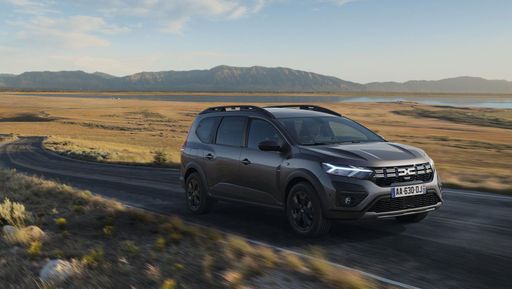 @ dacia-presse.de
@ dacia-presse.de
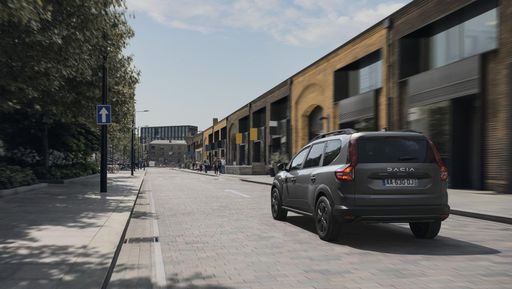 @ dacia-presse.de
@ dacia-presse.de
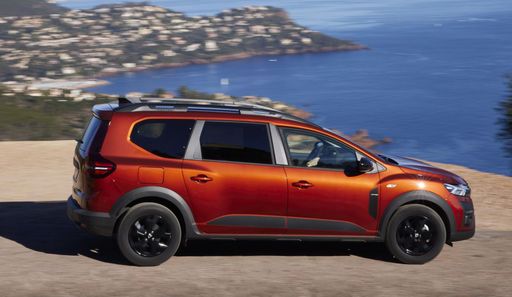 @ dacia-presse.de
@ dacia-presse.de
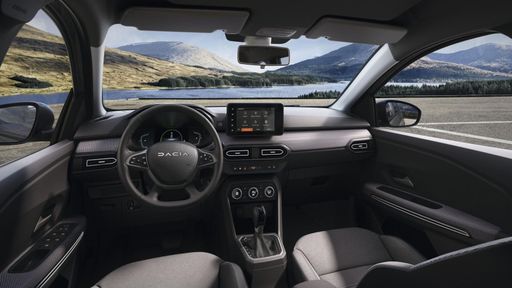 @ dacia-presse.de
@ dacia-presse.de
Jeep Compass
The Jeep Compass combines a rugged aesthetic with modern sophistication, making it a standout choice in the compact SUV segment. Its robust design is complemented by a comfortable interior that offers ample space and cutting-edge technology for a seamless driving experience. Whether tackling urban environments or venturing off-road, the Compass provides versatility and reliability, embodying the adventurous spirit synonymous with the Jeep brand.
details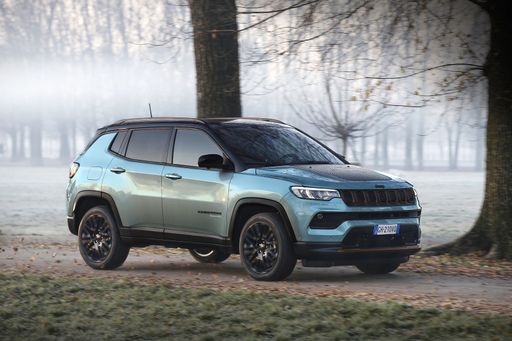 @ media.stellantis.com
@ media.stellantis.com
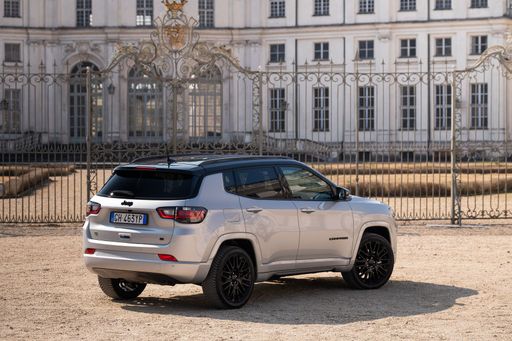 @ media.stellantis.com
@ media.stellantis.com
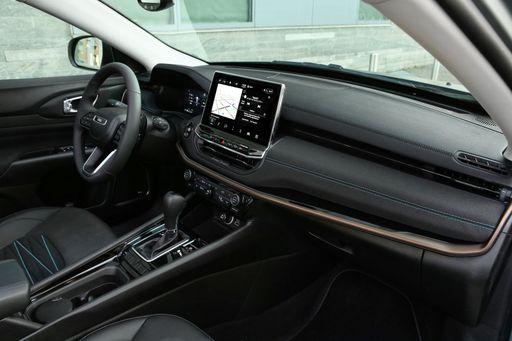 @ media.stellantis.com
@ media.stellantis.com
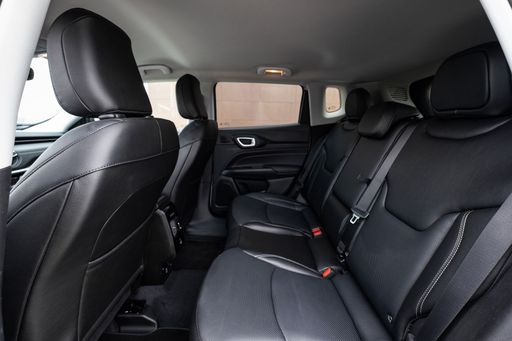 @ media.stellantis.com
@ media.stellantis.com
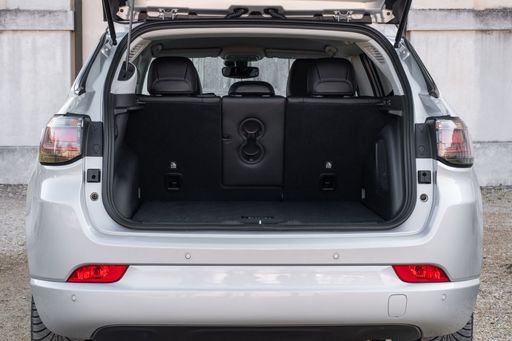 @ media.stellantis.com
@ media.stellantis.com

|

|
|
|
|
Costs and Consumption |
|
|---|---|
|
Price
15300 - 22600 £
|
Price
33900 - 46900 £
|
|
Consumption L/100km
4.7 - 7.7 L
|
Consumption L/100km
2 - 5.5 L
|
|
Consumption kWh/100km
-
|
Consumption kWh/100km
-
|
|
Electric Range
-
|
Electric Range
36 km
|
|
Battery Capacity
0.60 kWh
|
Battery Capacity
-
|
|
co2
105 - 137 g/km
|
co2
48 - 124 g/km
|
|
Fuel tank capacity
40 - 50 L
|
Fuel tank capacity
36 - 55 L
|
Dimensions and Body |
|
|---|---|
|
Body Type
MPV
|
Body Type
SUV
|
|
Seats
5 - 7
|
Seats
5
|
|
Doors
5
|
Doors
5
|
|
Curb weight
1251 - 1460 kg
|
Curb weight
1575 - 1935 kg
|
|
Trunk capacity
160 - 607 L
|
Trunk capacity
420 - 438 L
|
|
Length
4547 mm
|
Length
4404 mm
|
|
Width
1784 mm
|
Width
1819 mm
|
|
Height
1674 mm
|
Height
1629 - 1649 mm
|
|
Payload
393 - 582 kg
|
Payload
465 - 470 kg
|
Engine and Performance |
|
|---|---|
|
Engine Type
Full Hybrid, LPG, Petrol
|
Engine Type
Petrol MHEV, Plugin Hybrid
|
|
Transmission
Automatic, Manuel
|
Transmission
Automatic
|
|
Transmission Detail
Automatic Gearbox, Manual Gearbox
|
Transmission Detail
Dual-Clutch Automatic, Automatic Gearbox
|
|
Drive Type
Front-Wheel Drive
|
Drive Type
Front-Wheel Drive, All-Wheel Drive
|
|
Power HP
91 - 140 HP
|
Power HP
130 - 240 HP
|
|
Acceleration 0-100km/h
9.8 - 13.2 s
|
Acceleration 0-100km/h
7.3 - 10.3 s
|
|
Max Speed
167 - 174 km/h
|
Max Speed
183 - 200 km/h
|
|
Torque
160 - 200 Nm
|
Torque
240 Nm
|
|
Number of Cylinders
3 - 4
|
Number of Cylinders
4
|
|
Power kW
67 - 103 kW
|
Power kW
96 - 177 kW
|
|
Engine capacity
999 - 1598 cm3
|
Engine capacity
1332 - 1469 cm3
|
General |
|
|---|---|
|
Model Year
2024
|
Model Year
2024
|
|
CO2 Efficiency Class
C, D
|
CO2 Efficiency Class
D, B
|
|
Brand
Dacia
|
Brand
Jeep
|
Dacia Jogger
Introducing the Dacia Jogger: A New Era of Affordable Versatility
The Dacia Jogger has revolutionised the automotive industry by combining practicality and cost-efficiency with innovative features. This multi-purpose vehicle is perfect for families and adventurers alike, offering remarkable versatility alongside a competitive pricing strategy.
Powertrain Options: A Broad Spectrum of Choice
Dacia provides a range of powertrain options to cater to diverse preferences. The Jogger comes equipped with a selection of full-hybrid and turbocharged petrol engines. The full-hybrid version delivers a robust output of up to 140 PS, coupled with an impressive fuel efficiency of 4.7 to 4.8 L/100km. For those preferring a conventional setup, the ECO-G petrol engines offer up to 110 PS, promising a reliable and economical drive with a fuel consumption ranging from 5.7 to 7.7 L/100km.
Innovation in Every Journey
One of the notable innovations in the Jogger is its intelligent use of space. The model boasts a generous seating capacity, comfortably accommodating 5 to 7 passengers, depending on the configuration. With features like adjustable seats and a large boot space extending up to 607 litres, the Jogger is designed to handle anything from family vacations to transporting bulky items.
Design and Comfort: More than Meets the Eye
The Dacia Jogger showcases a modern design, with a robust and aerodynamic silhouette. Measuring 4547 mm in length, it strikes a balance between spaciousness and manoeuvrability. The comfort of the Jogger is enhanced by its well-crafted interior, offering various amenities across different trim levels, including Expression and Extreme, available in both five and seven-seater configurations.
Performance and Handling: Tailored for Every Terrain
Equipped with front-wheel drive and a choice between manual and automatic transmissions, the Jogger assures a smooth driving experience. Its engines, offering up to 103 kW (140 PS), ensure adequate power delivery, while the model accelerates from 0-100 km/h in just under 10 seconds. With a top speed of up to 174 km/h, the Jogger is well-suited for both urban and highway driving.
Affordability and Economy: A Balanced Proposition
Dacia continues to uphold its reputation for affordability with the Jogger, offering a competitive price range between €17,900 and €26,400. This pricing, combined with low maintenance and operating costs, makes the Jogger a highly attractive option in the MPV market. Its monthly costs are estimated between €701 and €821, ensuring outstanding value for budget-conscious consumers.
Conclusion: The Versatile Choice
The Dacia Jogger is a vehicle that offers practicality, efficiency, and innovation without breaking the bank. With its diverse range of configurations and features, it is aptly capable of meeting a wide array of needs, whether for family tasks or everyday adventures. The Jogger is more than just a means of transportation; it is a testament to Dacia’s commitment to delivering quality and value.
Jeep Compass
Exploring the Jeep Compass: A Modern SUV with Innovative Features
The Jeep Compass continues to challenge the boundaries of what an SUV can be, offering a blend of practicality, efficiency, and rugged appeal. This model, distinguished by its diverse range of powertrains, promises to cater to various needs and preferences. From urban commuting to exploring off-road trails, the Compass delivers with aplomb.
Engine Versatility and Performance
Under the bonnet, the Jeep Compass offers a diverse lineup of engines designed to meet varying driver demands. With options ranging from mild hybrid petrol engines to advanced Plug-in Hybrid Electric Vehicles (PHEVs), the Compass provides both efficiency and power. This impressive engine choice results in power outputs from 130 to 240 PS, ensuring that there is a model suitable for both city driving and more ambitious off-road excursions.
Performance devotees will appreciate the Compass's quick acceleration, clocking 0-100 km/h in as little as 7.3 seconds. Meanwhile, fuel economy remains commendable, with consumption figures between 1.7 to 5.5 litres per 100 kilometres, making the Compass an economical choice for daily driving.
Innovative Hybrid Technology
The Jeep Compass brings cutting-edge hybrid technology to the forefront. The available plug-in hybrid variants offer electric-only driving ranges of up to 53 kilometres, ideal for environmentally conscious urban drivers. This zero-emission capability makes short trips sustainable without compromising on the flexibility offered by the internal combustion engine for longer journeys.
Dynamic Drivetrain Options
One of the main talking points of the Compass is its adaptable drivetrain options, which include both front-wheel drive and all-wheel drive systems. The 4xe PHEV models particularly stand out with their all-wheel drive, providing enhanced stability and traction suitable for varying terrains. Additionally, the automated transmission ensures smooth gear changes and an overall comfortable driving experience.
Design and Comfort
Beyond performance, the Jeep Compass excels in providing a stylish and functional environment. The SUV's dimensions, ranging between 4398 to 4404 mm in length and up to 1874 mm in width, offer ample interior space for both passengers and cargo. The boot space varies from 420 to 438 litres, accommodating the needs of families and adventure-seekers alike.
With seating for five, maximum comfort is assured, thanks to high-quality materials and thoughtfully designed interiors. The Compass integrates advanced technology seamlessly into its cabin, ensuring easy connectivity and an engaging driving experience.
Safety and Efficiency
Safety is paramount in the Jeep Compass, with a range of driver assistance features providing peace of mind. The model adheres to impressive CO2 efficiency standards, boasting a CO2 emission range between 37 and 123 g/km, making it both a responsible and reliable choice.
Furthermore, the Compass offers competitive running costs, with monthly expenses ranging from €1,095 to €1,315, and an average cost per kilometre between 43.8 and 52.6 cents. This cost-effectiveness further underscores the Compass’s value proposition.
Conclusion
Overall, the Jeep Compass stands out as a richly equipped, versatile SUV, ready to tackle urban or off-road challenges. With its blend of powertrain innovations, superior performance, and sophisticated design, it redefines what’s possible in the SUV segment. Whether for efficient city driving or adventurous journeys into the unknown, the Compass is ready to rise to the occasion.
The prices and data displayed are estimates based on German list prices and may vary by country. This information is not legally binding.
